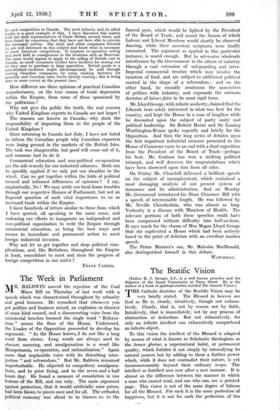The Week in Parliament
MR. BALDWIN moved the rejection of the Coal Mines Bill on Thursday of last week with a speech which was characterized throughout by urbanity and good humour. He remarked that whenever you got politics and business mixed, an explosion or disaster of some kind ensued, and a disconcerting voice from the ministerial benches boomed the single word " Referen- dum " across the floor of the House. Undeterred, the Leader of the Opposition proceeded to develop his argument,' " As the House knows, I do not like a long word from choice. Long words are always used to obscure, meaning, and amalgamation is a word like Mesopotamia, co-operation, and rationalization." Again came that implacable voice with its disturbing inter- jection " and referendum." But Mr. Baldwin- remained imperturbable. He objected to compulsory amalgama- tions, and to price fixing, and to the seven and a half hours day. He found a measure of consolation in one feature of the Bill, and one only. The main argument against protection, that it would artificially raise prices, had been blown to pieces once and for all. The orthodox political economy was about to be thrown on to the funeral pyre, which would be lighted by the President of the Board of Trade, and round the flames of which Labour and Liberal Members would shortly be observed dancing, while- their ancestral scriptures were finally consumed. The orpiment as applied in this particular instance, is sound enough. But he advocates wholesale interference by the Government in the affairs of industry through a vast extension of safeguarding and inter- Imperial commercial treaties which may involve the taxation of food, and are subject to additional political control in the shape of a referendum ; and on the other hand, he roundly condemns the association of politics with industry, and expounds the outworn doctrine of laissez-faire in its most rigid form.
Mr. Lloyd George, with infinite audacity, claimed that the Liberals were solely interested in what was best for the country, and kept the House in a roar of laughter while he descanted upon the subject of party unity and political leadership. Sir Robert Horne and Sir Laming Worthington-Evans spoke cogently and briefly for the Opposition. And then the long series of debates upon the first important industrial measure presented to the House of Commons came to an end with a final exposition from the President of the Board of Trade—perhaps his best. Mr. Graham has won a striking political triumph, and well deserves the congratulations which have been showered upon him from all sides.
On Friday Mr. Churchill deliVered a brilliant speech on the subject of unemployment," which contained a most damaging analysis of our present system of insurance and its administration. And on Monday Mr. Greenwood introduced his Slum Clearance Bill with a speech of interminable length. He was followed by Mr. Neville Chamberlain, who was almost as long. Verbosity is a disease with Ministers of Health. The relevant portions of both these speeches could have been compressed without difficulty into half-an-hour. It says much for the charm of Miss Megan Lloyd George that she captivated a House which had been actively bored to the point of delirium with an excellent maiden speech.
The Prime Minister's son, Mr. Malcolm MacDonald, also distinguished himself in this debate.
WATCHMAN.


























































 Previous page
Previous page